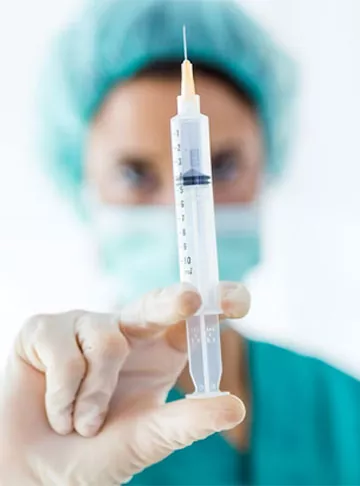For couples facing infertility issues, assisted reproductive technology (ART) procedures like In Vitro Fertilization (IVF) offer a ray of hope to achieve their dream of parenthood. IVF has revolutionised fertility care by using advanced technology and a team of expert doctors to help couples conceive. However, as with any medical procedure, there are potential side effects associated with IVF injections and medications. In this comprehensive guide, we will delve into the various aspects of IVF injection side effects, and IVF stimulation medication side effects, and look into what couples can expect during their fertility journey.
Understanding IVF Injections and Medications
IVF is a multi-step process that involves stimulating the ovaries to produce multiple eggs, retrieving the eggs, fertilising them in a laboratory dish, and then transferring the resulting embryos into the uterus. The success of this procedure often relies on the precise administration of hormone injections and medications. In this respect, IVF hormone injection side effects should also be considered.
What are the side effects of hormone injections in IVF?
1. Physical Discomfort: One of the most common side effects of IVF injections is localised pain, redness, or swelling at the injection site. This discomfort is usually mild and subsides shortly after injection.
2. Ovarian Hyperstimulation Syndrome (OHSS): In some cases, the ovaries may respond excessively to the stimulation drugs, leading to OHSS. Mild OHSS may cause bloating and abdominal discomfort, while severe OHSS can result in fluid retention and even require medical intervention. Your doctor will closely monitor your response to the medications to mitigate the risk of OHSS.
3. Mood Swings: Hormonal fluctuations triggered by the injections can sometimes lead to mood swings or emotional sensitivity. It's important to communicate any emotional changes with your healthcare provider, who can offer support and guidance.
4. Hot Flashes: Hormone medications used in IVF can induce hot flashes, like those experienced during menopause. These episodes are temporary and usually diminish once the medication regimen is completed.
5. Allergic Reactions: While rare, some individuals might experience allergic reactions to the components of the injections. Signs of an allergic response include rash, itching, or difficulty breathing. Seek immediate medical attention if you suspect an allergic reaction.
What are the Side Effects of IVF Medications?
- Nausea and Vomiting: Some women may experience IVF medication side effects like mild nausea or vomiting because of hormone medications.
- Breast Tenderness: Hormonal changes are also one of the side effects of IVF medication and can lead to breast tenderness or swelling.
- Headaches: Occasional headaches are a possible side effect of IVF medications. Staying hydrated and practicing relaxation techniques may help reduce their frequency.
IVF Trigger Shot Side Effects
The trigger shot is a crucial step in the IVF process that prompts the ovaries to release mature eggs for retrieval. Common IVF trigger shot side effects include:
- Localised Sensations: Similar to other injections, the trigger shot can cause temporary discomfort, redness, or swelling at the injection site.
- Ovulation-like Symptoms: Given its purpose, the trigger shot can sometimes induce sensations akin to ovulation. Some women might experience mild pelvic discomfort or a feeling of fullness.
Exploring Potential Side Effects of IVF Stimulation Drugs
1. Abdominal Discomfort: As ovaries respond to stimulation drugs, some individuals might experience abdominal discomfort. This sensation is often likened to mild menstrual cramps and is usually temporary.
2. Fatigue: Hormonal changes induced by IVF medications can lead to feelings of fatigue or exhaustion. Prioritising adequate rest and incorporating light exercise into daily routines may help combat this effect.
3. Injection Site Reactions: Beyond physical discomfort, injection sites might develop reactions such as itching, bruising, or slight irritation. Maintaining proper injection techniques and adhering to medical guidelines can minimise such reactions.
4. Digestive Issues: Sometimes, side effects of IVF stimulation drugs can lead to hormonal fluctuations that can occasionally impact digestion, resulting in symptoms like bloating or constipation. Ensuring a fibre-rich diet and staying hydrated can aid in managing these issues.
Prioritising Self-Care Throughout the Journey
Understanding and addressing side effects is vital, but equally important is the notion of self-care during the IVF journey. Here are some tips to consider:
1. Open Communication: Maintain open lines of communication with your medical team. Regular check-ins enable adjustments to medication dosages or strategies based on your responses.
2. Psychological Support: Acknowledge the emotional toll that fertility treatments can have. Seek support from counsellors, support groups, or therapists to navigate the psychological aspect of the journey.
3. Healthy Lifestyle Choices: Opt for a balanced diet rich in nutrients, engage in gentle exercises like yoga or walking, and prioritise sleep. These lifestyle choices contribute to your overall well-being.
4. Mindfulness Techniques: Incorporate mindfulness practices such as meditation or deep breathing to manage stress and anxiety that might arise during the process.
5. Partner Involvement: Encourage your partner to actively participate in the journey. Their emotional support can be invaluable in coping with challenges and celebrating milestones.
Frequently Asked Questions:
1. Does IVF affect your body?
IVF is not seen to have any significant long-term effects on your body. Only temporary side effects like weight gain during pregnancy, mild pain at the site of injections, mood swings, etc. are seen.
2. Is IVF safe for babies?
A common misconception among people is that IVF is unsafe for babies or that IVF babies are born weak. However, this is not true. IVF babies are born just as healthy as children conceived naturally.
3. Can IVF damage your ovaries?
Taking IVF injections or medications under the guidance of a qualified and expert medical practitioner can minimise any possible health risks or side effects. IVF does not damage your ovaries or overall health.
4. Can I get pregnant after taking an IVF injection?
The elaborate procedure of IVF includes egg/oocyte retrieval, fusion of eggs and sperm, embryo transfer , etc. preceded by the administration of IVF injections. Hence, the chances of getting a successful IVF pregnancy can differ from person to person.
In Summary
Embarking on the IVF journey embodies resilience and the pursuit of dreams. Understanding the realm of IVF injection side effects and IVF stimulation drugs side effects is an integral stride in this journey. While these effects exist, their impact is ameliorated through the adept support of healthcare professionals. Indira IVF is equipped with state-of-the-art technology and 330+ expert medical professionals who stand as pillars of strength, enabling couples to navigate IVF confidently and realise their vision of building a family. With Indira IVF, more than 330+ couples have successfully achieved IVF pregnancy.
Remember, everyone’s experience with IVF is unique, so staying informed and partnering closely with your medical team empowers you to make informed decisions. By embarking on this journey with confidence, you're one step closer to realising your parenthood dream. To book an appointment at Indira IVF Centre, call: 18003092323.
Pregnancy Calculator Tools for Confident and Stress-Free Pregnancy Planning
Get quick understanding of your fertility cycle and accordingly make a schedule to track it















